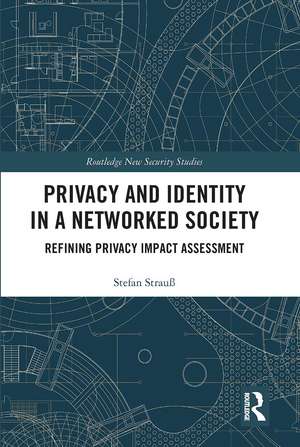Privacy and Identity in a Networked Society: Refining Privacy Impact Assessment: Routledge New Security Studies
Autor Stefan Straußen Limba Engleză Paperback – 18 dec 2020
Privacy is among the most endangered "species" in our networked society: personal information is processed for various purposes beyond our control. Ultimately, this affects the natural interplay between privacy, personal identity and identification. This book investigates that interplay from a systemic, socio-technical perspective by combining research from the social and computer sciences. It sheds light on the basic functions of privacy, their relation to identity, and how they alter with digital identification practices. The analysis reveals a general privacy control dilemma of (digital) identification shaped by several interrelated socio-political, economic and technical factors. Uncontrolled increases in the identification modalities inherent to digital technology reinforce this dilemma and benefit surveillance practices, thereby complicating the detection of privacy risks and the creation of appropriate safeguards. Easing this problem requires a novel approach to privacy impact assessment (PIA), and this book proposes an alternative PIA framework which, at its core, comprises a basic typology of (personally and technically) identifiable information. This approach contributes to the theoretical and practical understanding of privacy impacts and thus, to the development of more effective protection standards.
This book will be of much interest to students and scholars of critical security studies, surveillance studies, computer and information science, science and technology studies, and politics.
| Toate formatele și edițiile | Preț | Express |
|---|---|---|
| Paperback (1) | 393.05 lei 6-8 săpt. | |
| Taylor & Francis – 18 dec 2020 | 393.05 lei 6-8 săpt. | |
| Hardback (1) | 1003.58 lei 6-8 săpt. | |
| Taylor & Francis – 3 mai 2019 | 1003.58 lei 6-8 săpt. |
Preț: 393.05 lei
Nou
Puncte Express: 590
Preț estimativ în valută:
75.22€ • 78.24$ • 62.10£
75.22€ • 78.24$ • 62.10£
Carte tipărită la comandă
Livrare economică 14-28 aprilie
Preluare comenzi: 021 569.72.76
Specificații
ISBN-13: 9780367730130
ISBN-10: 0367730138
Pagini: 292
Dimensiuni: 156 x 234 x 15 mm
Greutate: 0.54 kg
Ediția:1
Editura: Taylor & Francis
Colecția Routledge
Seria Routledge New Security Studies
Locul publicării:Oxford, United Kingdom
ISBN-10: 0367730138
Pagini: 292
Dimensiuni: 156 x 234 x 15 mm
Greutate: 0.54 kg
Ediția:1
Editura: Taylor & Francis
Colecția Routledge
Seria Routledge New Security Studies
Locul publicării:Oxford, United Kingdom
Public țintă
Postgraduate, Professional, and UndergraduateCuprins
1. Introduction: Is privacy suffering from a digital disease? 2. A systemic perspective on privacy and identification 3. The interplay between identity, identification and privacy 4. Identification practices and the digital transformation of society 5. The privacy control dilemma of digital identification 6. How to regain control? Assessing privacy by design and privacy impact assessment 7. Towards an identifiability-based framework for privacy impact assessment 8. Is effective treatment of privacy possible? Summary and concluding remarks
Notă biografică
Stefan Strauß is Senior Researcher at the Institute of Technology Assessment at the Austrian Academy of Sciences in Vienna, Austria.
Recenzii
'This latest volume in the Routledge New Security Studies series addresses the many facets of securing user privacy and individual identity in today’s networks. Strauss (Austrian Academy of Sciences) leads readers through his critique of the current state of privacy in the digital age, then presents the means available for bringing the situation under control. ... Each chapter is independently annotated with notes and list of references. The index is expertly crafted. Summing Up: Recommended. Upper-division undergraduates through faculty and professionals.'--J. Beidler, University of Scranton, CHOICE
Descriere
This book offers an analysis of privacy impacts resulting from and reinforced by technology and discusses fundamental risks and challenges of protecting privacy in the digital age.






















